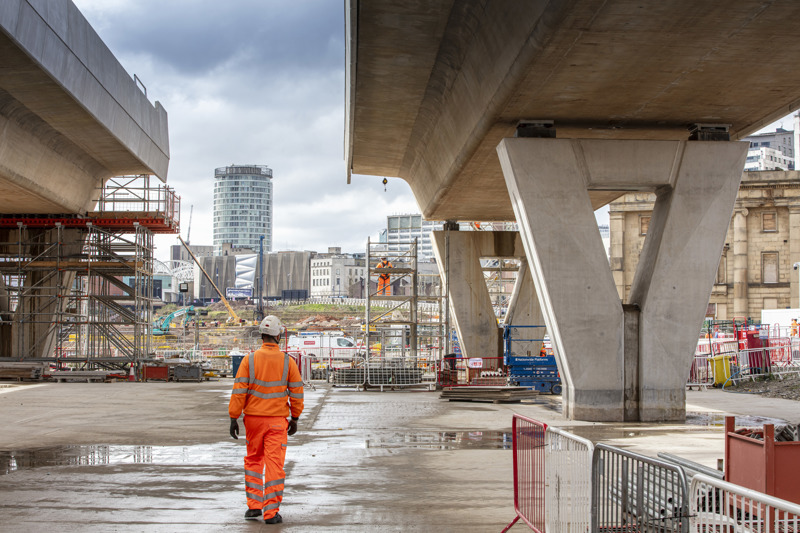
The Government has committed more money to major rail projects such as Transpennine Route Upgrade (TRU) and East West Rail, although day-to-day funding for the Department for Transport (DfT) is set to fall in real terms over the next five years.

The Government has committed more money to major rail projects such as Transpennine Route Upgrade (TRU) and East West Rail, although day-to-day funding for the Department for Transport (DfT) is set to fall in real terms over the next five years.
A total of £10.2bn will be spent on rail infrastructure projects (excluding HS2) between 2026/27 and 2029/30.
The full Spending Review published by the Treasury confirmed money for capital investments will increase in real terms while resource funding will go down.
The DfT has Departmental Expenditure Limit (DEL) funding of £31.5bn in 2028/29, with capital investments (excluding HS2) increasing in real terms by an average of 3.9% per year between 2025/26 and 2029/30.
The Government said: “Resource DEL funding falls in real terms over the period, primarily driven by a declining rail passenger services subsidy as passenger ridership and revenue continue to recover post COVID-19 and efficiencies and savings are made through public ownership.”
Speaking about TRU, Chancellor Rachel Reeves said a quarter of the route between Manchester, Leeds and York was due to be electrified “by this summer”.
She went on to say TRU would receive another £3.5 billion of funding.
“But my ambition, and the ambition of people across the North, is greater, still. And so, in the coming weeks, I will set out this government’s plan to take forward our ambitions for Northern Powerhouse Rail,” she said in the House of Commons.
HS2 will also receive £25.3bn of funding over the settlement period which will “support the full reset…addressing longstanding delivery challenges”.
Turning her attention to East West Rail, she said she would provide another £2.5bn, as well as funding for the Midlands Rail Hub, something she described as “the region’s biggest and most ambitious rail improvement scheme for generations” which would improve connections from Birmingham and into Wales.
A further £445 million will also be spent on railways in Wales over the next decade, including new funding for Padeswood sidings (on the Borderlands Line between Wrexham and Bidston) and Cardiff West Junction.
It also includes money for stations in South Wales that were identified in the Burns Review.
Leeds station is also going to receive £240m for capacity enhancements.
There was no mention of Midland Main Line electrification, plans to restore the Portishead line or Ely area capacity enhancement.
The Railway Industry Association welcomed the Government’s support.
Chief Executive Darran Caplan said: “This Spending Review follows the announcement last week of £15bn of funding for local transport in city regions, including metro and tram networks, whether the Midlands, Sheffield, Greater Manchester, Yorkshire, Tees Valley, Newcastle, or West of England. Rail businesses from every part of the UK will want to be involved with delivering those schemes, as the Government and devolved bodies take them forward.”
The Government has also published the findings of its Green Book review; the guide on how to appraise policies, programmes and projects.
The Government wants to introduce “place-based business cases” that will “make sure that central government properly assesses the complementarities between different projects, such as housing and transport”, as well as simplifying and shortening it.
It will also: “Continue to address the overemphasis on benefit-cost ratios (BCRs) in government appraisal, banning the use of arbitrary BCR thresholds as a simple means of determining if a project should be funded.”
Caplan said plans to reassess the Green Book framework should be “applauded”.
Transport for London is also set to receive £2.2bn of funding between 2026/27 and 2029/30 for its capital renewals programme.
London’s Transport Commissioner, Andy Lord, said: “It will mean that we can complete the introduction of new trains on the Piccadilly line and DLR and new signalling on 40 per cent of the Tube, can procure a new tram fleet, progress discussions on new Bakerloo Line trains and can get to work on renewing some of London’s critical roads, tunnels and flyovers.”
However, London TravelWatch said it was "disappointing" there was a lack of extra funding such as the DLR and Bakerloo Line extensions, and it was "unclear whether the £2.2billion allocated will be enough to enable TfL to make good past under-investment in maintaining and renewing the existing network".
Reeves also repeated the £15bn funding for regional transport schemes, describing it as “the biggest ever investment of its kind” which includes “stations in Merseyside and Middlesbrough”, Metro extensions in Birmingham, Stockport and Tyne and Wear and the West Yorkshire Mass Transit.
The Government also promised to invest in British Steel’s Scunthorpe works, which will include orders for new rail and tram rails.
Login to continue reading
Or register with RAIL to keep up-to-date with the latest news, insight and opinion.


















Dicky Mint - 11/06/2025 14:47
With this Government throwing another 23 billion on HS2, would it not make scene to complete the whole project?